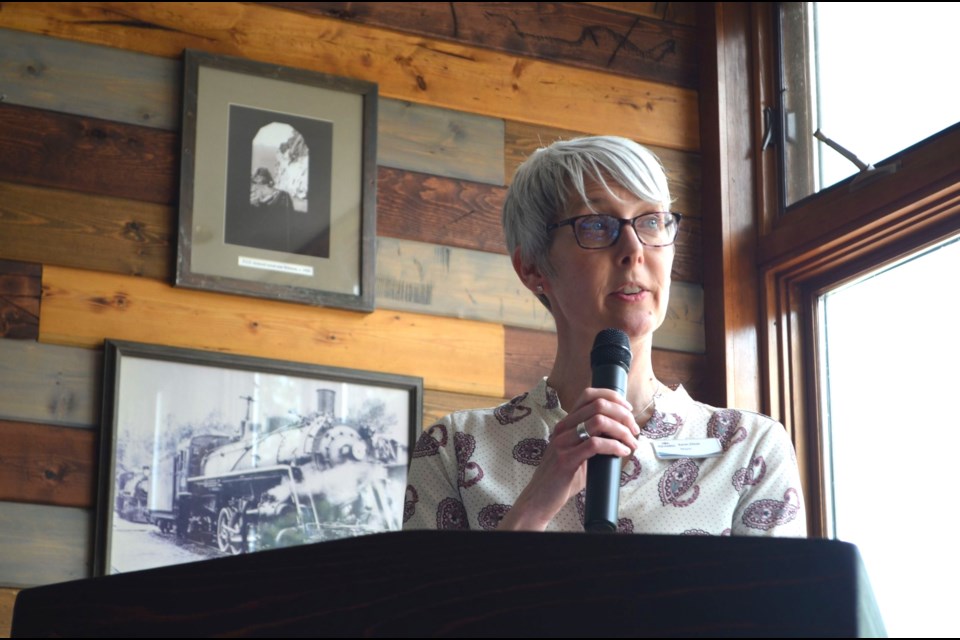Squamish's mayor has declared that she will not be seeking re-election this fall.
On June 1, Karen Elliott announced at the annual mayor's lunch with thethat she will not be putting her name on the ballot.
"It has been an absolute privilege to serve as your mayor for the last four years and to have been part of council since 2014," said Elliott during the luncheon at Howe Sound Brewery.
"After eight years of working with council to effect positive change in this community, many of the policies I felt were missing or needed to be updated have been completed or are well underway. And so I would like to turn my time and energy to new career challenges and opportunities."
Elliott has served two terms as an elected official. She first came to office during the previous council term as a councillor. This term, she took the helm as mayor.
In her speech, Elliott said that she navigated the town through the pandemic, ongoing growth pressures, two destructive acts at the gondola, fires, atmospheric rivers, heat domes, a record-breaking transit strike, among other things.
"I will leave office at the end of October proud of my contributions," she said.
Elliott's tenure in office has been dominated by issues surrounding the environment, affordable housing and development.
The environment has been a big sticking point for Elliott during her time in office.
"My daughters were a huge motivation for me running in 2014 and 2018," she said. "The adoption of an ambitious community climate action plan and a municipal energy and emissions plan that are both built for innovation and success have been proud moments."
On that topic, other high-profile examples include fees and an upcoming ban on plastic bags; an emphasis on development that steered away from personal vehicles; policies that incentivized green materials in renovations and developments and a municipal declaration of a climate emergency.
Elliott and some of her fellow councillors also championed the idea of creating walkable neighbourhood developments.
Environmentalists have lauded the efforts, but they have not gone unopposed. For instance, the perceived lack of parking in future developments has been a common complaint among some of the public, and many have questioned whether shifting away from the car is possible in a rural community where public transit is often inconsistent.
On the topic of affordable living, Elliott promised at the start of her term in office that she would have 125 new affordable units built.
On Wednesday, when answering a question from The 小蓝视频, she acknowledged that this promise has not come into fruition.
"Clearly not. So [Spirit] Creek, yes, that's 76 units. But that doesn't get us all the way there," said Elliott, referring to the Buckley Avenue affordable housing project.
"I think we've put all of our eggs in one basket in that conversation with 小蓝视频 Housing.
We identified land. We thought, 'Hey, we've got the land, they'll come in with the funding quite quickly.' There was a sense of urgency. And for whatever reason, things have stalled at 小蓝视频 Housing."
However, she noted that the District has set up an arms-length affordable housing society, which will be dedicated around the clock to finding affordable housing solutions for the town.
"Our work on affordable housing is ongoing," she said later in her closing remarks. "But I'm proud that I've been part of approving over 800 units of affordable or purpose-built rental that are built or underway. And I'm excited that our housing society can continue that work."
The pace and scope of development have also been a standing point during Elliott's term as mayor.
Many have believed development occurred too fast, and others have pushed back on the concept of densification, which they say will ruin the character of at least some Squamish neighbourhoods. Some residents have organized anti-densification groups.
However, the mayor and some of council have maintained that density is a necessary way to avoid urban sprawl, make the best use of existing infrastructure and contribute to walkable communities.
There has also been a back-and-forth between the District and the community about amenity contributions, with some believing that developers have not been contributing enough, considering the windfall profits that many expect them to make.
Perhaps the first big test of Elliott's leadership lay with the dispute regarding the camping bylaws that many believed would severely limit the ability for people to live in their vehicles.
There were complaints that this targeted people who were most vulnerable on the housing spectrum, and while the bylaw was delayed after substantial protest, a version of it was passed with mixed reactions last year.
As her remarks drew close to the end, Elliott expressed her thanks to her fellow elected officials and District staff.
The mayor also shared one story that drew a few smiles from the audience.
"Two weeks ago, I had the pleasure of hosting a Grade 6 student who won [the] mayor for a day contest. At the end of the morning, as we sat eating pizza with her classmates, I asked her what she learned that morning that she didn't know about the mayor's role. She looked at me and said, 'You have a lot less power than I thought you had,' Elliott said.
The room filled with laughter.
"She is a very perceptive and smart young lady," Elliott continued. "But it's true, I am one vote and one person."




